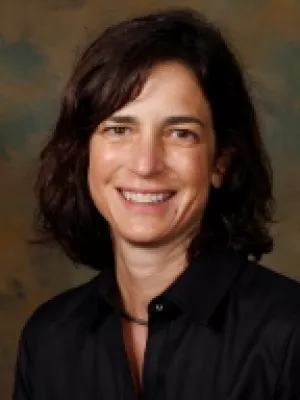Biography
Finlayson's research examines population-based surgical outcomes, focusing particularly on functional outcomes in the frail elderly.
Finlayson earned her medical degree at Harvard Medical School. She trained in general surgery at UCSF and in colon and rectal surgery at the Mayo Clinic in Rochester, Minnesota. She also earned a master of science degree at the Dartmouth Institute for Health Policy and Clinical Practice, and she completed a research fellowship with the White River Junction Veterans Affairs Medical Center in Vermont.
Finlayson served on the surgery department faculty at the University of Michigan and on the Michigan Surgical Collaborative for Outcomes Research and Evaluation. She returned to UCSF in 2009.
Education
| Institution | Degree | Dept or School | End Date |
|---|---|---|---|
| University of California | Diversity, Equity, and Inclusion Champion Training | 2019 | |
| Harvard University | M.D. | School of Medicine | 1997 |
Board Certifications
- American Board of Surgery, 2005
- American Board of Colon and Rectal Surgery, 2006
Clinical Expertise
Anal Cancer
Colitis
Colon Cancer
Constipation
Crohn's Disease
Diverticulitis
Fecal Incontinence
Hemorrhoids
Inflammatory Bowel Disease
Pelvic Floor Disorders
Presacral Tumors
Rectal Cancer
Ulcerative Colitis
Clinical Trials
- Related Conditions: Colon Cancer, Colorectal Cancer, Colorectal Tumor| Start Date: | End Date:
- Related Conditions: Communication| Start Date: | End Date:
Program Affiliations
- Philip R. Lee Institute for Health Policy Studies, UCSF
- UCSF Center for Surgery in Older Adults (CSOA)
Grants and Funding
- Developing Tools to Support the Appropriate Use of Surgery in Frail Older Adults | NIH | 2017-09-01 - 2020-05-31 | Role: Principal Investigator
- Optimizing treatment for nursing home residents with acute cholecystitis | NIH | 2014-04-15 - 2020-03-31 | Role: Principal Investigator
- Functional Outcomes After Major Surgery in Nursing Home Residents | NIH | 2006-09-01 - 2012-08-31 | Role: Principal Investigator
Research Narrative
Dr. Finlayson’s research focuses on using administrative data to examine ‘real world’ surgical outcomes in the elderly. For example, in an analysis of operative mortality in 1.2 million Medicare beneficiaries age 65 and older undergoing elective diagnostic high-risk surgery, she found that the risk of death increased dramatically with age. Her work examining the impact of age and comorbidity on operative mortality and survival among octogenarians undergoing cancer surgery demonstrated population-based mortality rates in octogenarians that were considerably higher than those reported in published reports from case series or trials. To better understand surgical risks in elders, she has explored the role of institutional factors in surgical outcomes. As is now widely recognized, her work demonstrated that provider procedure volume is inversely related to operative mortality for many high-risk operations and that this association was greatest in elder surgical patients.
In Dr. Finlayson’s most recent work, she uses a national nursing home registry to evaluate outcomes after surgery in long stay nursing home residents. She found that nursing home residents experienced high operative mortality for ‘low risk’ procedures. After operations to remove the gallbladder or appendix, more that 1 out of 10 nursing home residents died after surgery. She has also used this data to evaluate survival and functional status after colon cancer surgery and found that nursing home residents experience substantial and sustained functional decline after surgery. One-year survival was less than 50%.
The findings in her epidemiology research inspired the creation of the UCSF Center for Surgery in Older Adults. Under her leadership, the interdisciplinary team of stakeholders from surgery, anesthesia, rehabilitation services, geriatrics, palliative care, nursing, education, and health policy with expertise in quantitative research, qualitative research, and implementation science are working together to develop, implement, evaluate best practices in geriatric surgery through the development of a geriatric surgery registry. Our overarching goal is to discover best practices in geriatric surgery through patient-centered outcomes assessment, comparative effectiveness analyses, and interventional trials. In addition, we identify and explore barriers to delivery of optimal care with the aim to improve implementation of interdisciplinary patient-centered surgical care for older adults at UCSF and beyond.
Research Interests
Surgical outcomes in frail elderly patients
Publications
- Risk factors and associated outcomes of postoperative delirium after open abdominal aortic aneurysm repair.| | PubMed
- Social Strain is associated with Functional Decline in Older Adults after Surgery.| | PubMed
- Reimagining Ambulatory Care in Urology: Conversion of the Urology Clinic into a Procedure Center Improves Patient's Experience.| | PubMed
- Clinician Review of Advanced Care Planning for Older Surgical Patients Requiring Intensive Care.| | PubMed
- Trends in the Use of Gabapentinoids and Opioids in the Postoperative Period Among Older Adults.| | PubMed
- Experiences with targeting inpatient advance care planning for emergency general surgery patients: A resident-led quality improvement project.| | PubMed
- Multisite Implementation of an American College of Surgeons Geriatric Surgery Quality Improvement Initiative.| | PubMed
- Cognitive Impairment is Common in a Veterans Affairs Population with Peripheral Arterial Disease.| | PubMed
- Missed Opportunities and Health Disparities for Advance Care Planning Before Elective Surgery in Older Adults.| | PubMed
- High risk of complications after a "low risk" procedure: A national study of nursing home residents and older adults undergoing haemorrhoid surgery.| | PubMed

